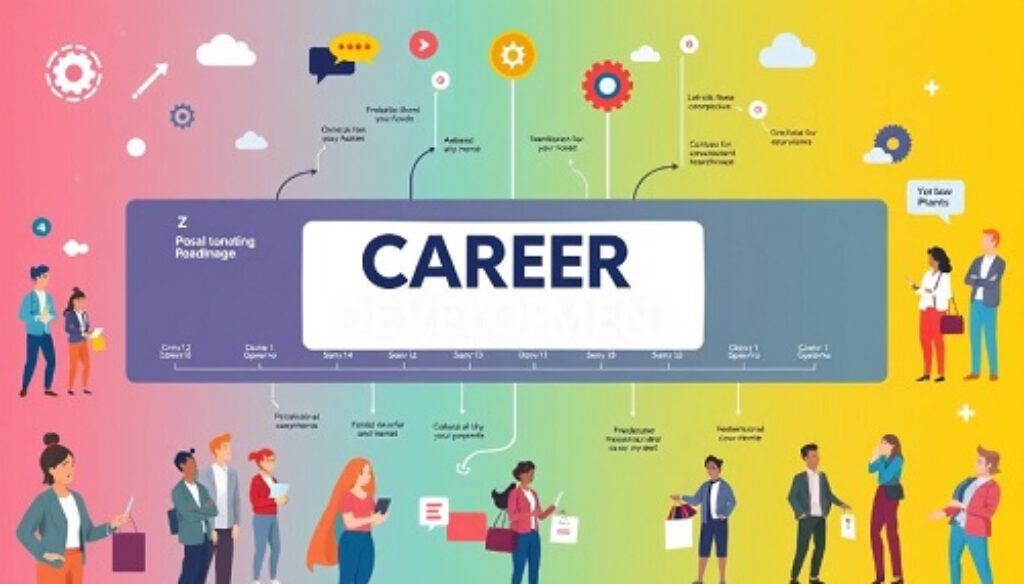Introduction:
Have you ever wondered what makes some people excel in their careers while others struggle?
Creating a personal career development strategy is key to effective career planning. It’s like a roadmap for your professional dreams. It keeps you on track to reach your goals.
A structured plan is crucial for career growth, but it’s often overlooked.
Whether you want to change careers, get a promotion, or ensure job happiness, a good plan helps. We’ll show you how to make a personalized career roadmap that matches your goals.
This will give you the focus and drive you need in a competitive job market.

Key Takeaways
- 59% of millennials prioritize opportunities to learn and grow in their careers.
- 60% of UK professionals view career development as crucial during job searches.
- Setting SMART goals enhances the effectiveness of career development plans.
- Upskilling employees boosts ROI and reduces turnover rates.
- Tracking and regular reviews are essential for identifying progress and obstacles.
What is a Career Development Strategy?
Creating a personal career plan is a smart move for our future. It’s a detailed document that outlines our career goals and how to reach them.
It helps us track our progress and guides our professional path.
Definition
A career development plan is a detailed strategy for our career. It outlines our goals, current skills, and skills we need to improve.
It’s a key tool for navigating our professional lives and achieving our goals.
Key Components
Here are the main parts of a career development plan:
- Summary Statement – A brief overview of our career goals.
- Short-term and Long-term Goals – Specific milestones to reach within certain times.
- Skills Analysis – Identifying our current skills and what to work on.
- Resources – Opportunities for growth, like training and mentorship.
- Actionable Steps – Specific steps and education to reach our goals.
Importance of Having a Career Development Strategy
Having a personal career plan is crucial. It gives us a clear path, aligning our daily work with our long-term goals. It also helps us stay focused and motivated.
It encourages both personal and professional growth. 87% of people who use career plans see significant progress. And 93% get valuable feedback and growth opportunities.
Regularly reviewing and updating our plans keeps them effective. This leads to a 76% higher success rate compared to those who don’t track their plans.
Benefits of a Career Development Strategy
Career development plans are very helpful for both individuals and companies. They help us set goals and track our progress.
This way, we can grow in our careers and reach our long-term goals.
Provides a Roadmap for the Future
A career development plan gives us a clear path for the future. It helps us set goals and move forward in our careers. Many reports show that this approach makes us more productive and helps the company too.
Identifies Skills Gaps
It also helps us find out where we need to improve. By knowing our weaknesses, we can work on them. This is key for growing in our careers and staying ahead in the job market.
Companies like Google and Netflix use specific goals to help their employees grow.
Inspires Motivation
Lastly, a good career plan motivates us. Achieving our goals makes us feel accomplished and keeps us going. It gives us clear goals and learning chances, helping us stay motivated.
This is important because stress can keep us from working well.
By having a career plan, we set ourselves up for success. It helps us grow in our careers and benefits the companies we work for.
Assess Your Current Position
Understanding where we are in our careers is key to planning our future. It helps us make smart choices about growing professionally.
We’ll look at our current jobs, do a SWOT analysis, and ask for feedback from others.
Evaluate Your Current Role
To analyze career progress, start by evaluating your current job. Think about what you do, where you work, and what you like or don’t like.
About 83% of people look for ways to improve their skills in their current job, showing they’re eager to grow.
Conduct a SWOT Analysis
A SWOT analysis helps you understand your career better. It lets you see your strengths, weaknesses, opportunities, and threats.
This way, you can focus on your strengths and work on your weaknesses.
Seek Feedback from Peers and Managers
Feedback is crucial for personal growth. Asking peers and managers for their opinions can reveal areas you might not see yourself. About 65% of people need guidance to reach their career goals.
Getting feedback helps you see where you stand and plan your next steps.
Define Your Career Goals
Setting clear career objectives is key to any career plan. It gives us direction and motivation. We can turn dreams into real goals by setting both short-term and long-term targets.

Short-term Goals
Short-term goals are for the next three to five years. They might include learning new skills, getting a specific job, or earning certifications.
These goals help us take small steps toward bigger dreams.
Long-term Goals
Long-term goals look ahead to five to ten years or more. They might be about becoming a manager, starting a business, or reaching a high level in your field.
These goals help us see our ultimate dreams and plan our path.
Using the SMART Framework
The SMART framework is key for setting clear goals. It makes sure our goals are Specific, Measurable, Achievable, Relevant, and Timely.
For example, a SMART goal might be to “complete an advanced coding course in six months.”
Today, we have more career options than ever. Thanks to online learning, networking, and seminars.
By keeping our plans up to date, we stay ready for new opportunities.
Setting career goals is an ongoing process. Writing them down and tracking progress keeps us motivated. It helps us stay on track for long-term success.
Analyze Your Skills
Understanding our current skills is key to reaching our career goals. A thorough skills gap analysis helps us see our strengths and weaknesses. This lets us set clear goals to bridge the gap between where we are and where we want to be.
Identifying Existing Skills
We start by listing our current skills. This includes both technical and soft skills from past jobs, education, and personal life.
Sites like Coursera offer over 7,000 learning programs, including Professional Certificates from big names like Google and IBM. A Coursera Plus subscription is $59/month, and professional certificates usually take six to seven months to complete.
Recognizing Skills Gaps
To find skills gaps, we compare our current skills to what we need for our dream jobs. Tools like the Quality Assurance Agency for Higher Education (QAA) guidelines help. They focus on career and employability, study, and personal development.
Spotting these gaps helps us make a focused improvement plan.
Setting Skill Development Objectives
After finding gaps, we set clear goals for improvement. Using the SMART criteria makes sure our goals are specific, measurable, achievable, relevant, and time-bound.
This might mean getting new certifications through Coursera to match our career goals. Professional development programs can also prepare us for promotions or career changes.
A careful approach to skills gap analysis leads to ongoing growth and moves us closer to our career dreams.
How to Create a Personal Career Development Strategy That Works
To make a strong career plan, we need a roadmap that fits our dreams. Creating a plan involves several steps. It makes sure our career matches our values and goals.

Step-by-step Guide
First, we must look inward and plan. Start by checking where you are now. Use self-assessments, and feedback from others, and look at your job and industry trends. Knowing your strengths and weaknesses is key.
Then, set clear goals. In IT, goals should be Specific, Measurable, Achievable, Relevant, and Time-bound.
Getting CompTIA certifications like ITF+, A+, Network+, and Cybersecurity+ can help you move up in your career.
Next, work on the skills you need. Find out what skills you lack and plan to improve them. Take courses, get mentors, and network to grow professionally.
Common Mistakes to Avoid
Don’t set goals that are too high without a solid plan. It’s important to regularly check and update your plan. Do this at least once a year or when your goals or situation changes.
Another mistake is not getting support. Having your manager’s backing is crucial for moving up. Also, spend time on professional growth through mentoring, networking, and practice.
By regularly checking and updating your plan, you can keep your career on track with your changing goals.
Identify Resources and Support
Starting your journey to professional growth means using many career support tools. These resources help us stay on track and focused.
Let’s look at some key resources for reaching your career dreams.
Mentorship Opportunities
Mentorship is a big help. Experienced mentors offer insights, advice, and encouragement.
They guide us through work challenges and help with networking. This support is key to reaching your goals and success.
Professional Development Programs
Professional development programs are also crucial. These can come from employers or industry groups.
They provide learning experiences to improve our skills and knowledge. By joining these programs, we keep up with trends and grow our careers.
Online Courses and Workshops
Online learning is now a big help. Sites like Coursera, LinkedIn Learning, and Udemy have many courses. They let us learn at our own pace, fitting into our busy lives.
This is great for improving our skills and reaching our goals.
Using these resources helps us grow our careers, stay motivated, and reach our goals faster. With so many tools available, achieving your professional goals is within reach.
Create an Actionable Strategy
To move our careers forward, we need to turn our dreams into a real plan. This plan should have clear steps to reach our goals.
Most successful plans use SMART goals — specific, measurable, achievable, relevant, and time-bound.
Breaking Down Goals into Manageable Steps
Breaking down big goals into smaller tasks is key. It makes big dreams feel doable and lets us enjoy small wins. 78% of people say clear goals are crucial for career growth.
Creating Milestones and Timelines
Setting milestones and timelines is important. These markers help us see how far we’ve come and make changes if needed.
For example, setting goals for six months to a year helps stay focused and motivated.
Tracking Progress
Keeping an eye on our progress is essential. 53% of professionals regularly check their plans. This helps celebrate wins and adjust strategies as needed.
Implement and Review Your Strategy
Now that we have our career development plan, it’s time to start working on it. This is the first step towards making our career dreams come true. It’s not just about having a plan.
It’s about taking action every day to reach our goals.
Start Taking Action
Starting can be tough, but it’s key to turning our dreams into real actions. We break down big goals into smaller tasks to make progress easier.
By doing something every day or week, like learning a new skill or networking, we stay on track.
Regularly Review and Update Your Strategy
It’s important to check our progress often to stay on the right path. A regular review helps us see how far we’ve come and make changes as needed.
This keeps our plan fresh and helps us reach our goals.
By updating our plan often, we celebrate our wins and fix any problems. This keeps us motivated and focused on our long-term goals.
Regular reviews help us move forward with confidence and clarity.
Adjusting Your Strategy to New Circumstances
In the world of career development, being adaptable is key. It helps us stay on track and open to new chances. Let’s look at how to adjust our goals and adapt to job market changes.
Being Flexible with Your Goals
Flexible goal setting lets us change course when needed. It’s important to check our career goals often. This ensures they match our growth and the industry’s changes.
Studies show that 25% of employees stay longer when their company supports career growth.
By setting SMART goals and updating them, we can overcome obstacles and stay motivated.
Adapting to Changes in the Job Market
To stay relevant, we must keep our skills up to date. New technologies and fields pop up, so we need to act fast.
Spotting skills gaps is crucial; 70% of employees say they need to address them to move forward.
Companies see a 15% boost in employee skills after targeted training. By being adaptable, we stay competitive and happy in our jobs.
Re-evaluating Your Progress
Regularly checking our career plans keeps them fresh and tailored. It helps us see how our goals match our current dreams.
We can celebrate wins and find areas to improve.
Updated plans lead to 20% more satisfaction and engagement. Performance reviews are great for discussing and tweaking our plans.
This keeps our careers moving up.
Adjusting our career plans is a continuous journey. By embracing adaptability and flexible goal setting, we can thrive in the changing job market and reach our long-term goals.
Conclusion
Creating a personal career development plan is key to success and reaching our professional goals. By using self-assessment tools like 360-degree feedback, we can understand our strengths and weaknesses.
This helps us see where we need to grow.
Setting SMART goals gives us a clear path to follow. Most successful people agree that this is crucial.
It helps us track our progress and make changes when needed.
Finding the right resources is also important. This includes mentorship, courses, and networking. These help us fill skill gaps and grow.
Plus, 82% of employees feel more motivated when their goals match the company’s.
Staying committed and resilient is essential. Most people say it’s important to keep going, even when it’s tough.
A personalized plan helps us grow and succeed in our careers.
FAQ
What is a personal career development strategy?
A personal career development plan is a detailed guide. It outlines your career goals and the steps to reach them. It turns daily tasks into steps toward big career dreams.
Why is having a career development strategy important?
It’s key to setting clear career goals and celebrating your wins. It helps spot skills you need to work on and maps out your career path. This ensures your choices lead to long-term success.
What are the key components of a career development strategy?
It includes a summary, short and long-term goals, and a skills check. It also lists action steps, resources, and strategies to reach your dreams.
How can a career development strategy inspire motivation?
It breaks down big goals into smaller steps and celebrates your progress. This keeps you motivated and focused on your career goals. It gives you direction and purpose.
How do I evaluate my current career position?
Start by looking at your current role, job duties, and work environment. Think about what you enjoy and what you’d like to change. Doing a SWOT analysis and getting feedback from others can also help.
What is the SMART framework for setting career goals?
SMART means your goals are Specific, Measurable, Achievable, Relevant, and Timely. This makes your goals clear and achievable, driving progress and accountability.
Why is a skills gap analysis important in career development?
It shows where you need to improve, helping you set specific goals. Pursuing training or certifications ensures you keep growing professionally.
What steps should I take to create a personal career development strategy that works?
First, assess your current role and set goals. Then, analyze and develop your skills. Identify resources and support, create a plan, and regularly review it.
How can I identify resources and support for career progression?
Look for mentors, professional development programs, and online courses. Adding these to your plan can boost your growth and open new opportunities.
How do I create an actionable career strategy?
Break down goals into smaller steps and set milestones. Track your progress regularly. This makes your journey more manageable and keeps you motivated.
Why is it important to regularly review and update my career development strategy?
Regular review keeps your plan current with your achievements and career changes. It ensures your path aligns with your evolving goals and circumstances.
How can I adapt my career strategy to new circumstances?
Be open to changing your goals as the job market evolves. Regularly check your progress to keep your goals in line with your aspirations and the market.
Source Links
- https://factorialhr.co.uk/blog/career-development/ – How to Create a Customised Career Development Plan for Each Employee
- https://successcoaching.co/blog/career-development-plan – How to Build a Career Development Plan | SuccessCOACHING
- https://www.gov.uk/government/publications/hr-career-frameworks/career-development-plan – Career Development Plan
- https://www.tealhq.com/post/career-development-plan – How to Build a Career Development Plan: 9 Steps
- https://www.airswift.com/blog/career-development-plan – How to create a career development plan
- https://online.york.ac.uk/resources/aspiring-senior-managers-guide/benefits-of-career-plan/ – Benefits of career plan – University of York


